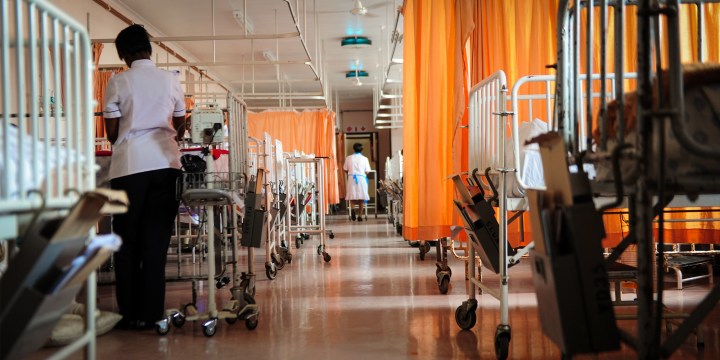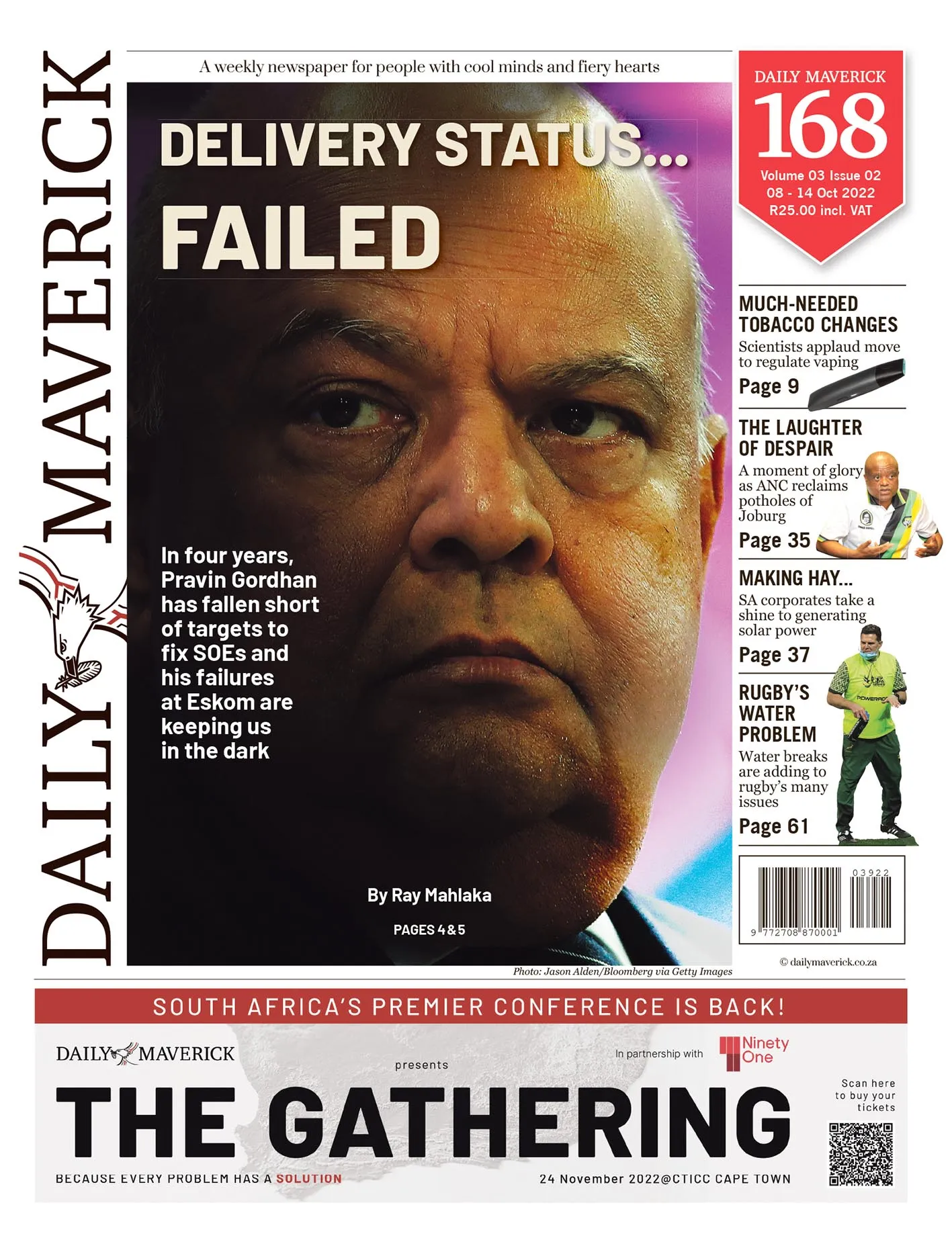HEALTHCARE CRISIS
Is the Wits University and Gauteng health department lifesaving deal on the road to nowhere?

The Gauteng public health system is a precious national asset. In addition to providing healthcare to more than 10 million people, it trains a large number of the country’s doctors and specialists. It serves as the training and research platform for the Faculty of Health Sciences at Wits University, South Africa’s biggest medical school with the highest number of graduating doctors. But, for a decade it has been synonymous with dysfunction, corruption, maladministration and death.
However, in June 2022, there was a ray of hope when it was announced that a new and far-reaching memorandum of agreement (MOA) had been reached between the Gauteng health department (GDoH) and Wits University.
“Gauteng and Wits University sign key agreement towards healing ailing health services”
“Delivery of quality healthcare and clinical training prioritised in Wits, GDoH agreement”
The 56-page, five-year agreement has still not been made public, but has been seen by Maverick Citizen. It was signed by Wits vice-chancellor Zeblon Vilakazi (on 14 April 2022) and Gauteng head of health Nomonde Nolutshungu (on 7 June 2022). It is the first MOA signed between the university and province since the last one lapsed in 2015.
Former premier David Makhura is understood to have taken personal responsibility to make sure the MOA was completed.
The memorandum is comprehensive and well structured. Its objective is “to foster a close and collaborative working relationship… with the objective of enabling functional, agile, well-managed, well-financed and governed Academic Health Complexes (AHCs) and Health Establishments to ensure the cost-efficient and effective delivery of quality Healthcare services to the public, the delivery of quality teaching and training to students and the conducting of research in line with international standards.”
The MOA’s ambitious “Purpose” (there are nine of them) includes:
- “To jointly govern the appointment, recruitment, management and discipline of Joint Staff;
- “To jointly govern and manage the allocation and use of funding for Health Services and other financial arrangements between the GDoH and the University; and
- “To develop joint mechanisms to rapidly deal with constraints and challenges in respect of the Service Platform.
In recent years much has been said about the poor management of hospitals such as Rahima Moosa Mother and Child Hospital and Chris Hani Baragwanath. This is usually blamed on political appointments that rarely appear to be based on merit or experience.
But in this regard, significantly, the MOA states that “the Vice-Chancellor and Principal and/or Dean of the Faculty of Health Sciences will be consulted by the GDoH on the process of appointing a CEO of an AHC of the Head of the Health Establishment, or a Chief Director or Clinical Manager of the Health Establishment in the AHC, notwithstanding the fact that these individuals may not be on the Joint Staff Establishment.” (emphasis added)
This step alone should improve the quality and accountability of Gauteng’s health services.
The parties to the MOA stated that within three months of the “effective date” of the agreement – presumably 7 June – key structures to ensure its implementation would have been formed.
These are: an overarching committee (made up of the most senior officials in the province and the university, including the health MEC, the DG in the Office of the Premier and Dean), a governance committee and an academic health complexes committee (made up of CEOs and clinical managers of hospitals “to manage day-to-day operations of respective AHCs”).
Last week, Maverick Citizen contacted Wits and the GDoH to find out what progress has been made since the agreement was signed.
According to Shirona Patel, head of communications at Wits University, “information-sharing sessions around the implementation of the MOA were held in July with Heads of Departments of the disciplines where joint staff are employed”.
“The Faculty and School will also be discussing the implementation of the MOA at their upcoming Faculty and School of Clinical Medicine retreats in October and November respectively.”
However, people who have spoken to us off the record suggest that the MOA has stalled before its implementation has even started. According to one senior official at the university, “the GDoH has been unresponsive in establishing the committees which were meant to implement the MOA”.
Enter the Public Service Commission… a decade late
According to Patel, “the GDoH is in the process of engaging with hospital management”, but she admits that “the committees stipulated in the MOA have not yet been established”.
This was because “the process of implementing the MOA was partly postponed due to the Public Services Commission, which is made up of a number of Chapter 9 institutions, convening a meeting to discuss inter alia the relationship between universities and the GDoH. This meeting has now been concluded, and a meeting will be convened between Wits and the GDoH to operationalise the MOA.”
Visit Daily Maverick’s home page for more news, analysis and investigations
However, the PSC, which seems belatedly to have woken up to the issue of service delivery in the public health service, is operating in a different timeframe to Wits, and shows little sense of urgency.
Their involvement started on 19 July 2022 when a letter was sent from Dr M Leballo, the caretaker commissioner for the PSC in Gauteng, to Ahmed Bawa, the CEO of Universities South Africa. The clumsy letter, which seems to be a cut-and-paste from a letter first addressed to the premier, reported that the Gauteng health department had “been selected to participate in the Citizen’s Forum”.
The letter says that “the Citizens Forum methodology enables the PSC to work closely with a particular section of citizens to define the service delivery needs and collectively find solutions”.
Seemingly unaware of the newly signed 2022 MOA, Leballo’s letter identified the need for “an open and transparent process” regarding the joint arrangement between the GDoH and Wits University that was concluded in 2008 because, he writes, the PSC “observed problematic areas” with the 2008 MOA, which it sets out in its letter.
The Citizens Forum took place on 13 September, but was said by participants in the meeting to have been poorly facilitated, directionless and without an obvious outcome – other than to delay an agreement needed to save lives.
According to one of the people present: “The MOA was not discussed at the PSC. The PSC was somewhat a forum for airing of opinions, rather than structured to address granular issues related to the MOA or implementation thereof.”
Last week, the PSC told Maverick Citizen that it would “publish the report on the outcomes of the Citizens Forum once all its internal processes are complied with (endorsement by the Commission and tabling at the Gauteng Provincial Legislature). The report will then be available for public scrutiny.”
The PSC is potentially a very important player in the health system, given its constitutional duty “to promote the values and principles set out in section 195 [of the Constitution], throughout the public service”. Section 195 sets out the “basic values and principles governing public administration”. However, the reasons for its sudden interest, ironically to the cost of an agreement that would improve health services and save lives, is not clear.
Gauteng health department
In the meantime, former Health MEC Dr Nomathemba Mokgethi has “suspended” the MOA.
The PSC says it met the MEC Mokgethi on 19 July and asked her “to put on hold the Wits MOA until the process of Citizens Forum is finalised”. They say the entire process “is envisaged to be finalised in November 2022. This process includes resolution of all concerns that the PSC noted.”
For its part the Gauteng health department offers another interpretation of what is going on.
Motalatale Modiba, the chief director: communications, told us: “During June 2022, the PSC identified the need to have an open and transparent process by means of a Citizens Forum regarding the joint arrangement between the department’s academic hospitals and the Gauteng Universities in the provision of quality healthcare to Gauteng citizens.
“The ultimate aim is to ensure that the parties in the joint arrangement understand their defined roles and responsibilities. This will ensure that there is optimal delivery of healthcare services to the citizens of Gauteng.” (emphasis added).
Modiba says: “The main objective of the Citizens Forum was to solicit views and inputs to ensure that the final agreement captures the broad understanding and the goals of the joint arrangement.
“In respect of the conclusion of the MOAs, the Chairperson of the PSC: Prof S Fikeni resolved at the Citizens Forum that the PSC will facilitate the conclusion of the MOAs between the Sefako Makgatho Health Sciences University, the University of Johannesburg, the University of Pretoria, the University of the Witwatersrand and the Gauteng Department of Health. The entire process is envisaged to be finalised in November 2022.”
A decade of crisis, corruption and life shedding
By the time the MOA is implemented in 2024 another year will have passed.
Unfortunately, this is just the latest chapter in a long-running struggle by Wits University to get the Gauteng health department and the national department to work with it in a genuine partnership that improves the management and quality of health services in Gauteng.
In 2013, in desperation, as the health system crumbled, Wits was on the verge of taking the unprecedented step of launching litigation against the GDoH and national health minister, as well as the premier and finance minister, to get them to fix the system.
A founding affidavit, to be signed by respected Professor Yosuf Veriava, lamented the “marked deterioration in Gauteng hospitals”, recording that:
“As healthcare practitioners in Gauteng, we have witnessed a severe, long-standing and widespread deterioration of public healthcare in Gauteng. Over the period of approximately five years, we have faced continued impediments to our ability to practise and teach medicine. The problems at the hospitals are multiple and include food shortages for patients, shortages of essential medicines and poor and inconsistent supply of essential equipment and medical supplies. The result is that we are impeded in our ability to provide patients with access to healthcare.”
Wits was represented by the legal NGO, SECTION27, whose lawyers took affidavits from a number of senior clinicians that detailed the crisis and its cost to teaching, care and life.
However, although legal papers were finalised and on the verge of being launched, a last-minute settlement was reached with the then health minister, Dr Aaron Motsoaledi. This included the appointment of PwC to help improve administration in the health system. On this basis, vice-chancellor Adam Habib declined advice to make the agreement an order of court, and was instead persuaded to accept a gentleman’s agreement with Motsoaledi.
Unfortunately, the rest is history. The confusion that now hangs over the latest MOA risks becoming another stillbirth in an attempt at system reform. DM/MC
Gauteng Health: timeline of neglect, maladministration and corruption
The provincial department of health has lurched from one scandal and crisis to another — with very little transparency or culpability.
2010: Then president Jacob Zuma issues proclamation for a SIU investigation into then Health MEC Brian Hlongwa.
2013: Wits University plans litigation against Gauteng Department of Health and reaches a settlement with then Minister Dr Aaron Motsoaledi. The National Treasury appoints PwC to help administer Gauteng.
2016: 144 mental healthcare patients die after being transferred from Life Esidimeni. Former deputy Chief Justice Dikgang Moseneke later describes the treatment the patients received as “torture”.
1 Feb 2017: Gauteng MEC for Health and Social Development Qedani Mahlangu resigns.
14 November 2017: Sheriff confiscates desks and computers at Gauteng Health because of non-payment of court-ordered legal payments.
November 2017: Gauteng Premier David Makhura appoints team to fix Gauteng Health, including Prof Max Lukhele, Craig Housham and Michael Sachs. The team’s report is never published.
June 2018: SIU releases the report of its investigation into Hlongwa as a result of an Access to Information application by SECTION27, TAC and Corruption Watch. The report finds corruption involving more than R1-billion.
2018: Super-bug Klebsiella pneumoniae outbreaks reported at Thelle Mogoerane hospital, where two babies die; and at Rahima Moosa hospital where nine babies die.
5 September 2018: Fire breaks out at the Bank of Lisbon building, Gauteng Health’s head office, gutting the building and destroying vital documents and records. Three firefighters die. A forensic report into the fire has not been released and the cause of the fire is still unknown.
2018: Arbitration into the Life Esidimeni disaster, with Moseneke as chaiperson, commences.
3 March 2019: Moseneke publishes his award at the conclusion of the Life Esidimeni arbitration.
July 2020: First reports into Covid-19 corruption in the purchase of PPE involving tens of millions of rands. Publicity leads to suspensions of the HOD and CFO. In 2022, the new CFO and hospital CEO are suspended after media reports about the corruption at Tembisa hospital uncovered by Babita Deokaran.
Publication of the Policy Implementation Guidelines on Patient Administration and Revenue Management 2020, as brought into effect by Gauteng Department of Health Circular 27 of 2020, limiting migrants’ access to health services. SECTION27 launches litigation against the policy in May 2022.
October 2020: Health MEC Dr Bandile Masuku is fired. Masuku later takes his dismissal on review, challenging the SIU’s investigation and report, but loses his case.
Makhura appoints another committee to fix Gauteng Health.
16 April 2021: Fire at Charlotte Maxeke hospital leads to closure of the hospital. Patients moved to other hospitals across the province. There were four fires in Gauteng hospitals in 2021 (two at Charlotte Maxeke, two at Steve Biko) and one at Chris Hani Baragwanath in 2022.
11 August 2021: TAC activists sleep out outside Makhura’s office to protest about conditions in the Gauteng health system.
23 August 2021: Acting Chief Financial Officer Babita Deokaran is shot dead outside her home.
January 2022: President Cyril Ramaphosa releases SIU “final” report into the procurement of Covid-19-related goods, works and services, including the finding on hospital corruption in Gauteng. Nine officials in Gauteng departments of health and infrastructure development are suspended.
May 2022: Paediatric gastroenterologist Prof Tim De Maayer publishes an open letter about conditions at Rahima Moosa Mother and Child Hospital. He is suspended, then reinstated.
June 2022: Memorandum of Agreement signed between Gauteng Health and Wits University.
September 2022: Maverick Citizen publishes the SAPS’s forensic report into the Charlotte Maxeke fire, confirming it was arson.
Medical negligence claims reach R1.6-billion in 2022.
During this time Gauteng has had seven MECs and nine heads of health. The MECs were: Brian Hlongwa, Hope Papo, Ntombi Megwe, Qedani Mahlangu, Dr Bandile Masuku, Gwen Ramokgopa and Nomathemba Mokgethi. DM
This story first appeared in our weekly Daily Maverick 168 newspaper, which is available countrywide for R25.



















 Become an Insider
Become an Insider
The dual appointment system creates an accountability vacuum, of which the staff take advantage, with moonlighting and private work becoming ubiquitous. Coupled with poor management systems (no data, no outcome or production reports plus little autonomy) and poorly trained managers (healthcare management in the public sector is very much an amateur endeavour, undertaken by unqualified staff) plus rampant GHD corruption, its a free for all. This can’t be checked alone by dedicated professionals, nor by lay appointees to hospital governance boards.
About a decade ago, I proposed to Wits that they pursue a model that combined the position of Dean of the Medical School and the Academic Hospital Complex management, taking responsibility for both teaching and clinical service delivery, a model that works well in other settings. The university would need to bring a combination of skills to bear across Faculties – Business, Legal, Economic, IT and Actuarial, and not just rely on Public Health. The Province (the GHD – where I once worked) would play a crucial non clinical support role, in procurement and supplies, waste disposal etc.
Still think its worth a shot, tinkering at the margins just isn’t enough.
Brian Ruff